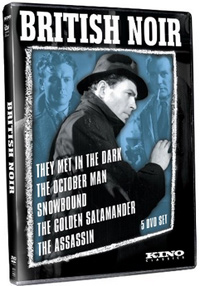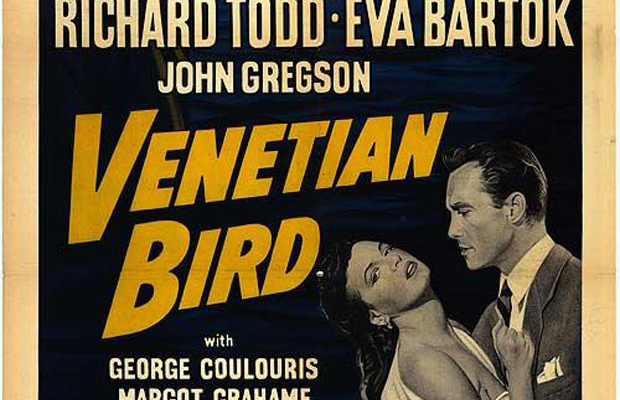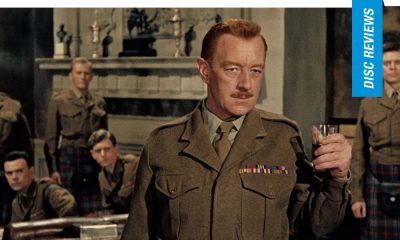Reviews
British Film Noir Collection | DVD Review
 In a novel effort to stress that film noir wasn’t a film movement specifically an output solely produced for American audiences, Kino Lorber releases a five disc set of obscure noir examples released in the UK. Spanning a near ten year period from 1943 to 1952, the titles displayed here do seem to chart a progression in tone, at least resulting in parallels with American counterparts. Though a couple of the selections here aren’t very noteworthy, either as artifacts of British noir or items worthy of reappraisal, it does contain items of considerable interest, including rare titles from forgotten or underrated auteurs like Ronald Neame, Roy Ward Baker, and Ralph Thomas.
In a novel effort to stress that film noir wasn’t a film movement specifically an output solely produced for American audiences, Kino Lorber releases a five disc set of obscure noir examples released in the UK. Spanning a near ten year period from 1943 to 1952, the titles displayed here do seem to chart a progression in tone, at least resulting in parallels with American counterparts. Though a couple of the selections here aren’t very noteworthy, either as artifacts of British noir or items worthy of reappraisal, it does contain items of considerable interest, including rare titles from forgotten or underrated auteurs like Ronald Neame, Roy Ward Baker, and Ralph Thomas.
They Met in the Dark
The earliest title in this collection is a 1943 title from Karel Lamac, They Met in the Dark, a pseudo-comedy noir that barely meets the criteria. Based on a novel by Anthony Gilbert (whose novel The Woman in Red was twice adapted for the screen, once in 1945 by Joseph H. Lewis as My Name is Julia Ross, and more notably in 1987 by Arthur Penn as Dead of Winter), stars a very young James Mason as a Royal Navy Commander who starts out being court martialed for revealing secrets to a pretty young woman who happens to be a Nazi. Considering this was released while the war was raging on, one has to take into consideration the pains to perhaps keep this entertainment light and escapist. At one point, a woman on a train to Liverpool even comments, “They say there’s a war on.” Mason is reunited with his co-star from 1942’s The Night Has Eyes, Joyce Howard, who gives a rather grating performance as a scrappy lass intent on solving the mystery of a corpse she discovers that is no longer there when she alerts the police. Considering the noir template was still fresh and undefined stateside (originating titles like Stranger on the Third Floor and The Maltese Falcon has only just been released in 1940 and 1941), we can see how They Met in the Dark can fit into the category, but it neither lives up to the enigmatic spirit of its title and rather plays like a romantic comedy.
The October Man
John Mills headlines this ‘wrong man’ scenario, an effective noir serving as the directorial debut of Roy Ward Baker. Based on a novel by Eric Ambler (who would adapt the screenplay for Ward’s famed 1958 Titanic film A Night to Remember in 1958, not to mention Jules Dassin’s Topkapi in 1964), Mills plays an emotionally fragile man following a devastating bus accident resulting in a head injury and the death of the young girl (Mill’s actual daughter Juliet) he was essentially babysitting. After a year in treatment, he’s released and returns to his profession as an industrial chemist, taking up residence at a nearby hotel. But before this can get into a cozy rhythm a la Separate Tables, a friendly young woman is found murdered (Kay Francis) and the police try to pin it on Mills since he borrowed her money, his check crumpled up next to her body. With his emotional state working against him, he depends on the help of his new girlfriend (Joan Greenwood) to help prove he’s not the killer.
Of course, it is blatantly evident who the killer is from the moment Kay Francis rebuffs the clearly obsessive tenant Mr. Peachey (a creepy Edward Chapman) early on, so there’s little surprise as to how this eventually plays out. Francis is entertaining in her supporting role as the struggling actress who seems to make a habit of borrowing money from interested male parties (she’s dabbles in astrology, hence the title), while Mills is routinely effective as this simple scenario permits. Baker, who would go on to direct Mills in a total of six features, seems to be getting his feet wet here, but it’s an interesting beginning for an underrated auteur who would go on to be known for dramatic features before helming some of Hammer Studio’s more eclectic fare (Asylum; The Anniversary).
Snowbound
Based on the novel The Lonely Skier by Hammond Innes (author of The Wreck of the Mary Deare, adapted in 1959), director David MacDonald directs this very dry, very British obscurity of a group of people searching for hidden Nazi treasure in the Alps. We don’t often get to see wintry noir; though lead Dennis Price, starring as a screenwriter who gets lassoed into infiltrating a group of ex-Nazi sympathizers by the director he’d been working for (Robert Newton) is very slow paced until the menacing Herbert Lom shows up—though it’s hardly a surprise as to what’s revealed about him. In many ways, this is no different than the 2015 Jude Law film Black Sea, directed by Kevin Macdonald, in which a crew of men gets stuck inside a submarine looking for a great big hunk of sunken Nazi gold. Since the print was unable to be remastered, the title is a preceded by a warning about the quality of the transfer.
Golden Salamander
Victor Canning wrote the novel upon which this is based (also the author of The Assassin, featured in this set), and is the sophomore directorial effort of Ronald Neame (The Poseidon Adventure; The Prime of Miss Jean Brodie), still fresh off his career as a cinematographer, which ended with a string of David Lean features (In Which We Serve; This Happy Breed; Blithe Spirit). Headlined by a dubious Trevor Howard as David Redfern, a British archaeologist sent to Tunis to collect Etruscan treasures currently molding in the basement of the wealthy Sefaris (Walter Rilla), he’s waylaid by a rainstorm in which he encounters a pair of African gun-runners (Herbert Lom, Jacques Sernas). Eventually, we learn they work for Sefaris, but the do-gooder Redfern has already committed emotional investment to Anna (Anouk Aimee) the French waitress in the local café, a woman dating one of the runners, whom Redfern offers to assist because it would benefit Anna’s emotional state (as played by Howard, he somehow comes across as moderately more interested in Sernas than Aimee).
Here, the villainous supporting characters dominate the film thanks to Rilla’s cool, calculated front man and an unusually swarthy Lom. This was Aimee’s fourth feature, here credited simply as Anouk. Critic Bosley Crowther devoted a great deal of his review admiring her youthful beauty…and little else. The titular salamander is a rather red-herring McGuffin, a statue with the inscription ‘Not by ignoring evil does one overcome it, but by going to meet it,’ meant as a bit of motivational heft for Howard, whose archeologist comes off as if Denholm Elliott had assumed the Indiana Jones position. Oswald Morris (Lolita; The Guns of Navarone) serves as DoP in a noir that leans into the exotic end of British noir.
The Assassin
Otherwise known by the much better title of The Venetian Bird, Ralph Thomas directs this adaptation of the Victor Canning novel (besides writing Golden Salamander he penned The Rainbird Pattern, which was the basis of Hitchcock’s final film, Family Plot, 1976). Thomas would eventually become quite famous thanks to his comedic series of Doctor films, starring Dirk Bogarde and beginning with the 1954 film Doctor in the House, a box office smash in the UK, which would yield six films altogether. Here, Thomas casts likeable Irish actor Richard Todd as a man searching Venice for an old war hero that would rather not be found. As such, the film feels much more European than others in the collection, utilizing the mysterious city quite effectively. Eva Bartok may be the romantic lead, but she’s outdone by the sassy support of Margot Grahame (they also co-starred in swashbuckling Burt Lancaster pic The Crimson Pirate that same year). Dripping with the kind of atmosphere defining the genre, The Assassin is most certainly film noir and is a great title to catch up with. It features a beautifully staged finale among the rooftops of Venice, enhanced by a score from Nino Rota and some beautifully menacing shots from Ernest Steward (who would work with Ralph Thomas on the Doctor series as well as with his brother Gerald Thomas and the popular Carry On series, which began in the late 60s with Carry On…Up the Khyber in 1968).
Disc Set Review:
With the exception of the deteriorated print of Snowbound, these mostly cleaned up restored versions look fair, though portions of Golden Salamander do seem extra murky and grainy, specifically in its rain drenched opening sequences. Each feature is presented in 1.33:1, and beyond its presentation as a box set, is otherwise bare bones, the selection assumedly based on their obscurity despite notable stars or directors and not much else.
Final Thoughts:
Remnants of the once powerful British film studio, Rank Organisation, this set feels like a plunder of forgotten archives. Certainly, titles may appeal to a wide variety of audiences based on interest in names like Anouk Aimee, John Mills, or James Mason (not to mention directors like Neame and Baker), but the prize jewel of the set is Ralph Thomas’ The Assassin.
They Met in the Dark
Film Review: ★½/☆☆☆☆☆
Disc Review: ★★★/☆☆☆☆☆
The October Man
Film Review: ★★★/☆☆☆☆☆
Disc Review: ★★★/☆☆☆☆☆
Snowbound
Film Review: ★★/☆☆☆☆☆
Disc Review: ★★★/☆☆☆☆☆
The Golden Salamander
Film Review: ★★★/☆☆☆☆☆
Disc Review: ★★★/☆☆☆☆☆
The Assassin
Film Review: ★★★½/☆☆☆☆☆
Disc Review: ★★★/☆☆☆☆☆

































